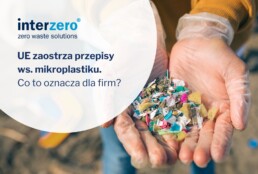
EU to tighten regulations for granulate processing companies. There is an agreement to reduce microplastic spills
The Council of the EU and the European Parliament have reached a preliminary agreement on the shape of legislation aimed at reducing microplastic pollution. This time, the EU regulations will apply to the entire plastic pellet supply chain and will mainly cover companies producing and processing plastic pellets.
Preventing granular leakage as a priority of new EU regulations
The purpose of introducing new legislation at EU level is to creation of procedures for dealing with plastic pelletswhich will apply at all stages of the supply chain, both on land and at sea.
- Microplastics are everywhere - in the oceans, seas and even in food. Up to 7,300 truckloads of plastic granules enter the environment every year. The EU has today taken a groundbreaking step to reduce this pollution - adopting measures to prevent the release of granules and to ensure their proper handling, including in maritime transport," stresses Paulina Hennig-Kloska, Minister for Climate and Environment.
As the communication reads, each pellet processing installation will have to establish a risk management planwhich will address how to deal with uncontrolled, accidental spillage of microplastics into the environment. It will therefore be the responsibility of the operators to develop procedures for packaging, unloading and loading of the granules, in addition to proper training of personnel and preparation of the necessary equipment.
The planned regulations are already another on the way to reducing environmental pollution from microplastics. As a reminder, in 2023, Commission Regulation (EU) 2023/2055 introduced a series of restrictions on the sale of products to which microplastics are intentionally added (e.g. cosmetics, cleaning products, fertilisers, medical devices, synthetic surfaces in sports facilities). You can read more about this in the article: EU glitter ban.
Equal obligations for EU and non-EU companies, simplification for the smallest entities
Under the new rules obligations concerning the handling of plastic granulate will apply not only to companies based in the EU, but also to non-EU operatorswhich operate on the territory of at least one Member State. This refers mainly to carriers (both inland and maritime transport) and logistics operators providing, inter alia, transport, storage or warehousing services.
According to the EU Council's official website, the scope of obligations for operators will depend on the size of the organisation and the weight of the pellets processed.
- Major players processing more than 1,500 tonnes of pellets per year, will have to be certified by an independent body.
- For smaller companies, also processing more than 1,500 tonnes of pellets per year, there will be a provision for simplified one-stop certification procedure carried out within 5 years of the entry into force of the Regulation.
- Companies handling less than 1,500 tonnes of pellets per year and micro-enterprises will only have to issue their own declaration of conformity.
To ensure compliance with EU regulations, companies not established in the EU will have to appoint an authorised representative in the EU, who will carry out all tasks on their behalf with regard to the microplastics processed and transported. The institution of an authorised representative (ACR) Authorised representative, AR) is no novelty - it already exists both in EU legislation and in the legal orders of most Member States.
Special conditions for maritime transport
Companies transporting pellets and regranulate by sea will also have a the obligation to ensure the quality of packaging and to provide information on transportin accordance with the guidelines of the International Maritime Organisation. This is all the more important because maritime transport accounts for as much as 38% of pellet transport throughout the EU[i]and spills that occur during freight often have a disastrous impact on the environment.
Read more about the ecological consequences of unintentional microplastic emissions in the article: Toxic microplastics in the water - meet nurdle, the mermaid tears you find on the beach.
[i] Data for 2022, https://www.gov.pl/web/klimat/porozumienie-w-sprawie-walki-z-zanieczyszczeniem-mikroplastikiem
When will we see the new regulations?
The interim agreement will now have to be approved by the Council of the EU and the European Parliament. It will then be formally adopted by both institutions (after legal and linguistic review) and published in the Official Journal of the EU.
The new micro-platform legislation will take the form of a regulation. This means that they will apply directly, without the need for transposition into Member States' legal orders. Regulation will enter into force 2 years after publication. In order to facilitate compliance in maritime transport, there is a possibility to defer its application for one year (compared to the other provisions set out in the Regulation).
Sources:
- Plastic pellet losses: Council and Parliament agree on new rules to reduce microplastic pollution, https://www.consilium.europa.eu/en/press/press-releases/2025/04/08/plastic-pellet-losses-council-and-parliament-agree-on-new-rules-to-reduce-microplastic-pollution/
- Agreement on combating microplastic pollution, https://www.gov.pl/web/klimat/porozumienie-w-sprawie-walki-z-zanieczyszczeniem-mikroplastikiem